The music of drummer John Colpitts as Man Forever is explorative, innovative and fearless; he’s a musician and composer equally versed in the disparate musical languages of DIY rock, improvisation, and contemporary classical. His most recent effort for Thrill Jockey is an album that defies genre classification. Propulsive, elaborate drum arrangements (created with TIGUE Percussion) remain essential to Man Forever – on the songs of Play What They Want, they are augmented by voice and melody with contributions from Laurie Anderson, Yo La Tengo, and Mary Lattimore to name a few. Play What They Want represents the culmination of 25 years of musical engagement by one of New York’s most acclaimed percussionists.
While Colpitts’ previous albums have expanded on the possibilities and limitations of drums and percussion, this new album redefines the project in myriad ways. Building on a complex rhythmic foundation, Man Forever created an album that is innovative, imaginative and joyous. Play What They Want is a rare record of untamed ambition that hits all its marks.
Ghettoblaster recently caught up with Colpitts to discuss the endeavor, the amazing collaborations that made Play What They Want what it is, and lessons he’s learned over 25 years of making music.
What is it about the Man Forever project that makes it such a rewarding endeavor for you?
I think it’s just a place where I have total control of the compositions. There’s still a ton of collaboration that goes into Man Forever. The percussion group Tigue worked on the percussion element of the album with me very closely – they get writing credit on the tunes they worked on. They brought ideas to the table – but at the end of the day I had the final say. It’s just a place for me to have a deeper kind of control with the material. I was the one who decided it was finished.
You have been performing for 25 years. What are the predominant lessons you’ve learned along that journey?
I think the main thing is that no one is going to care as much about your work as yourself. I think this is actually difficult to grasp for people. I realize I say that within an interview context so I’m grateful about that – but in the grand sense – no one cares. No one was like, “Hey dude – how’s the next Man Forever album coming?” It’s all on you. You really have to embrace this indifference and use it as an element to free your creativity.
When did you begin conceptualizing and composing Play What They Want?
Probably about three years ago. I started working on a project that I thought would be influenced by Moondog and in a way it was – but I thought it would be more direct. But then as I started to get deeper into the material I couldn’t follow that path and had to go elsewhere with it.
Were there any particular goals or benchmarks you were trying to reach with the album?
I think I just wanted to compose without limits – if I thought about it or conceptualized it I went for it. On other projects I was executing an idea or a concept but with this album I just followed the muse – I kind of let go as I listened to the material. What does the music want me to do? I just approached the music like that. It was really difficult and took a lot of work – but I’m happy with the result.
Some have called this your most accessible work to date. Was that on purpose?
I don’t think I shied away from hooks. I just indulged myself when I heard certain things. Nothing was off limits. I think though it’s pretty relative though! This is not *that* accessible. I knew I couldn’t make the same record again. I knew that it would feel different to me but I wanted to explode the expectations of this project. I didn’t want it be dismissed offhand with something like, “Oh yeah, this is Kid Millions messing around with drums.” I really wanted it to be surprising.
You had a lot of guests that played on this record too. I’m assuming they brought performances that surprised, impressed or enchanted you. Can you describe a couple of your favorites?
Such a nice question! Well – they were all pretty magical I have to say. I love when I get an idea in my head, and I seek someone out and then the performance just blows my mind. Like for instance, on “You Were Never Here” – I was hearing a stand up bass. I had a line in mind, but didn’t know who to hire. I asked around and my friend Andrew Barker recommended Brandon Lopez who I realized I had met at a gig a few months before. Brandon is incredible. His bass line just gelled the entire percussion ensemble. Sometimes I would experiment with taking it out and I couldn’t live without it! So that bass line set up the piece for what it became. It was magical.
Then of course I don’t think I can forget the experience we all had listening to Sam Yulsman perform piano on that track. He did three takes and it was the engineer Colin Marston, myself and my friend John Rosenthal who just happened to be visiting the session. I gave Sam a few notes and he just created an environment of profound depth with his performance. All of us in the control room looked at each other and felt like we were privileged to experience his performance. It was remarkable stuff. I must have listened to the piano, bass and percussion tracks for that piece 100 times on their own. Of course once I was adding other things, I needed to edit his performance – maybe I can released a stripped down version at some point.
Yo La Tengo came in and completely brought that tune into the place it needed to be. I had sung a guide track but Georgia Hubley was like, “Umm you should just let me sing this how I feel it, then we can see where we’re at.” Once she interpreted things I realized she was right. You have to let go sometimes…most times!
It would be nuts not to single out Tigue in this case – it’s hard to think about them separately because they are basically essential to this record in a way that a lot of the guests aren’t. Maybe you couldn’t call them guests. But, they are an incredible bunch of musicians and people. I’m so glad they believe in my music. Insanity!
I’d love to tell the story of working with Laurie Anderson on this. I’ve been lucky enough to play with her a number of times over the last couple of years and I kept hearing her voice on what became Twin Torches. There’s an entire version of the tune with me singing that didn’t really work. I had this idea about using the 20 oldest words in English that are still in continuous usage to write the lyrics. I don’t know how I stumbled across that idea – but I pitched it to her and she was interested. We actually recorded her performance at her studio. I had sent her my version of the lyrics and I hadn’t used those 20 words exclusively. I just tried to use them all once. She completely scrapped my lyrics except for one line! And it was the right move!
I just sat with her as she built the lyrics up from scratch, going back and forth with the list of 20 words. Seeing what combinations worked and didn’t work. Her first take is the one we used. I was also not expecting her to play violin! That was a great surprise because she just killed it! When I took the tracks home I knew I’d really taken the piece into another realm. I couldn’t believe my good fortune.
I’d be remiss not to mention some of the other people who were involved because really – there’d be nothing without them. Nick Hallett’s singing performances were so incredible and his presence helped me stay positive with the project. Phil Manley added so many amazing performances to the record. He lives in Oakland so I would be opening up these MP3s and seeing if he’d rescue a track I wasn’t sure about from the dust heap. He always blew my mind. Harpists Brandee Younger and Mary Lattimore were both incredibly inspiring musicians to work with. They really elevated the tracks. Ben Lanz added a horn chart to “Debt & Greed” at a point when I was lost with the song. It was just what it needed. Quince Contemporary Vocal Ensemble recorded their parts in Chicago and once I heard what they did I felt a bit of awe, like, “Wow this record might be something pretty special.” I mean that’s maybe not for me to decide anymore – but whatever.
I’m feeling bad because I think I’ll forget people – everyone added something crucial.
Were there some collaborations that you were hoping to do for the album that didn’t end up happening?
I don’t think so. I kept asked Shahin from Oneida to come in and play. I asked him like three different times and it didn’t end up working out. Next time!
What are your proudest moments on the record?
Pride is a tough one but I know what you mean. Basically I’m just happy and thankful for everyone who pitched in and gave of themselves to make this project happen. I’m just so glad that I saw it through to the end – that’s what I’m proud of. Actually finishing the thing!
(Visit Man Forever here: https://www.facebook.com/manforeverUSA/.)



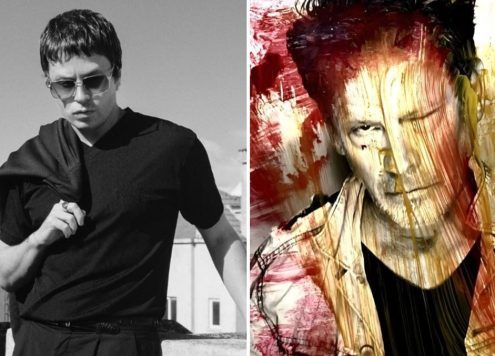
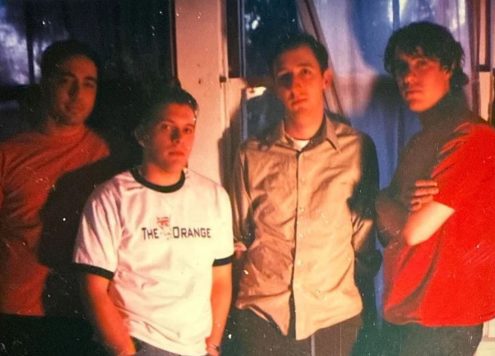
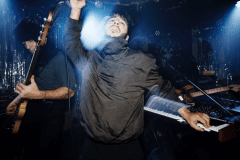

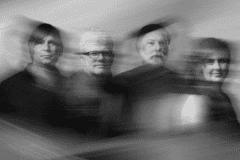
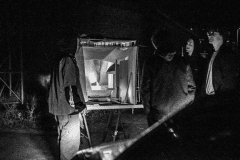

Social Media